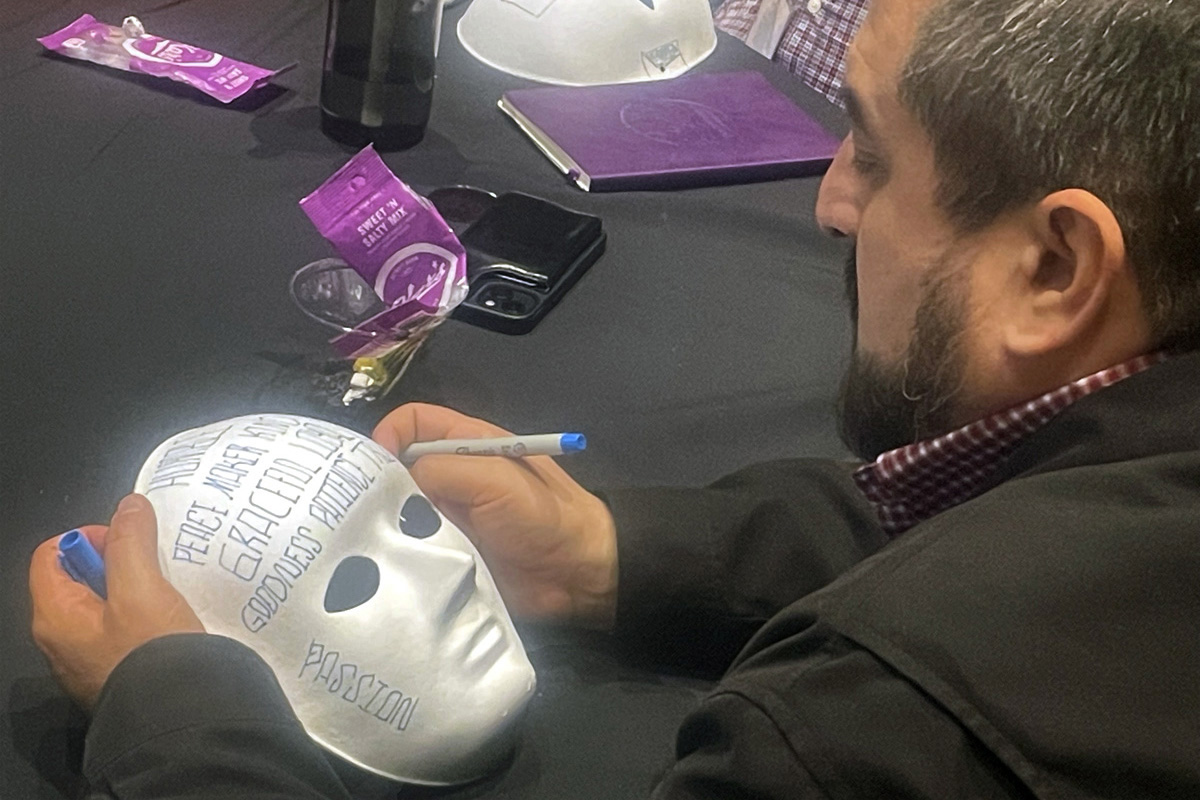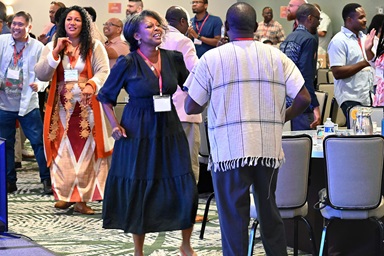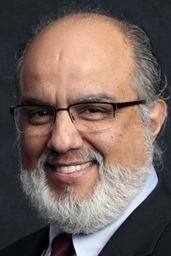Puntos Clave:
- Los/as pastores/as que sirven en ministerios interculturales se reunieron en Atlanta para ofrecerse apoyo mutuo y estrategias para afrontar los desafíos.
- Se ventilaron quejas de parcialidad y racismo, incluido el hecho de que ser ordenado/a es más difícil para los/as no blancos/as.
- Es necesario seguir presionando a La Iglesia Metodista Unida para que aborde estos problemas, dijo el Rev. Giovanni Arroyo, alto ejecutivo de la Comisión Metodista Unida de Religión y Raza.
Orgullosos/as estadounidenses en una iglesia metodista unida predominantemente blanca en las afueras de Atlanta enarbolan una bandera estadounidense para conmemorar el Día de los/as Veteranos/as. ¿Quién se opondría? Quizás le sorprenda saber que ese tipo de banderas ondeadas podrían alarmar a los/as residentes no blancos/as del vecindario pues a los ojos de algunos/as, la bandera estadounidense ha sido adoptada como símbolo por supremacistas blancos/as y grupos de extrema derecha, lo que nubla las aguas para los/as estadounidenses patriotas.
"Una de las formas en que las personas de color identifican un escenario potencialmente racista es cuando ven una iglesia que es exclusivamente blanca y les apasiona especialmente la bandera estadounidense" dijo el Rev. Tony Phillips, pastor asociado de la Iglesia Metodista Unida Bethany en Smyrna, Georgia.
Phillips, quien es negro, tiene el llamado de traer diversidad a iglesias como Bethany, donde la membresía no representa las comunidades multiculturales en las que se encuentran. "Son conversaciones amables pero miras esa bandera y piensas: 'Dios, no deberíamos izar la bandera'. Pero no puedes quitarla porque causaría tanta fricción que Fox News estaría allí" dijo y añadió que estos problemas surgen “de izquierda a derecha”. "Si hay un grupo que va de excursión al Museo 'Lo que el viento se llevó', eso probablemente no sea algo que la gente de nuestra comunidad no blanca vaya a aceptar".
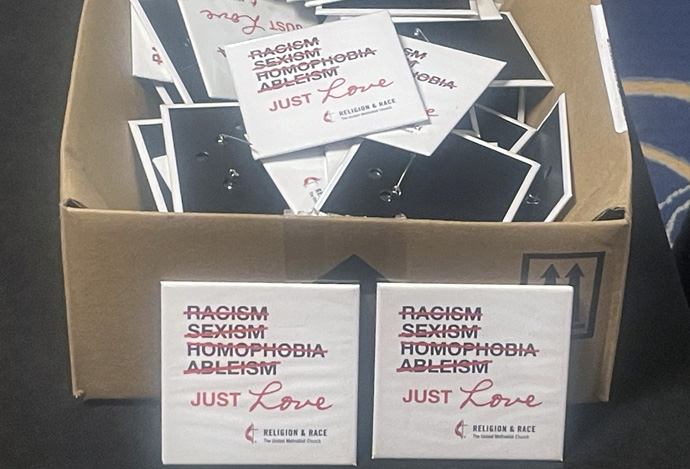
Discusiones como ésta abundaron en la conferencia Enfrentando el Futuro celebrada del 14 al 16 de noviembre en un hotel del centro de Atlanta. El evento organizado por la Comisión Metodista Unida de Religión y Raza atrajo a unos/as 300 asistentes, en su mayoría pastores/as metodistas unidos/as que sirven en ministerios interculturales. Los objetivos de la conferencia incluyeron ofrecer apoyo y afirmación, así como brindar talleres prácticos para ayudar a los/as pastores en dichos ministerios.
Hubo expresiones de dolor y esperanza. “Esta es la realidad del ministerio interracial y transcultural y una de las razones por las que surgió esta conferencia es: ‘¿Cómo creamos un lugar que contenga un espacio donde este grupo de líderes de toda la iglesia pueda ser realmente vulnerable y no sentir que esto puede usarse en su contra?'” dijo el Rev. Giovanni Arroyo, alto ejecutivo de Religión y Raza.
En un ejercicio revelador durante la conferencia, se distribuyeron máscaras en blanco a los/as pastores/as, quienes fueron invitados/as a decorarlas con marcadores de colores. El exterior de la máscara debía expresar el rostro que muestran al mundo exterior, mientras que la parte interior debía reflejar cómo desearían que los demás los/as percibieran.
“Es posible que entremos usando una máscara para hacer lo que Dios nos ha llamado a hacer, porque no podemos reconocer plenamente quiénes somos en nuestra etnia; quiero estar en un lugar donde me acepten por lo que soy y pueda predicar de la manera en que Dios me hizo nacer para predicar, y sentir nuevamente el gozo de mi llamado” dijo la Revda. Dyanne Corey, anciana de Virginia.
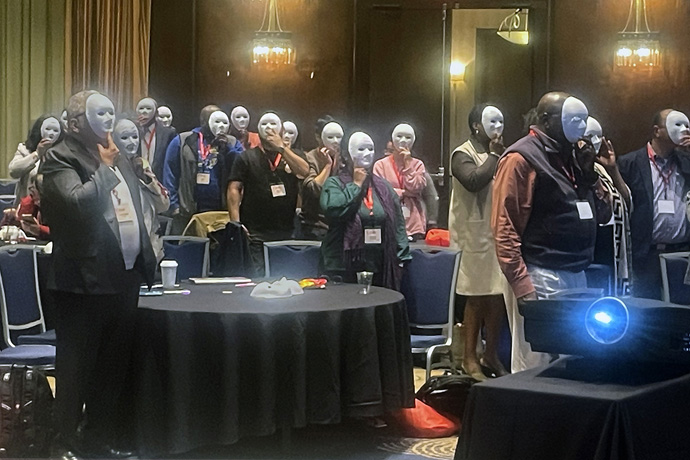
Dawn Houser, pastora de la Iglesia Metodista Unida Aitkin en Aitkin, Minnesota es una líder nativa americana en la iglesia mayoritariamente blanca. Houser dijo que su nombre y apariencia le dan la opción de ocultar o restar importancia a su origen nativo americano, pero ella no hace eso: “Cuando comencé mi labor allí, no sabían que yo era nativa americana. Son un buen grupo de personas y es interesante para ellos/as. No creo que consideren mi llamamiento como algo intercultural”. Sin embargo, dijo haber recibido amenazas racistas de personas ajenas a la iglesia, incluidas amenazas de violencia.
Su herencia hace que su enfoque del cristianismo sea un poco diferente, pues prefiere predicar sobre la historia de los/as nativos/as americanos/as en lugar de la de los/as israelitas del Antiguo Testamento, y no se refiere a Jesús como "Señor".
"Para las personas que han sido colonizadas, es un problema real. No usar el término ‘Señor’ no tiene nada que ver con Jesús; los/as nativos/as americanos/as lo tomarían como un desaire hacia Jesús” dijo.
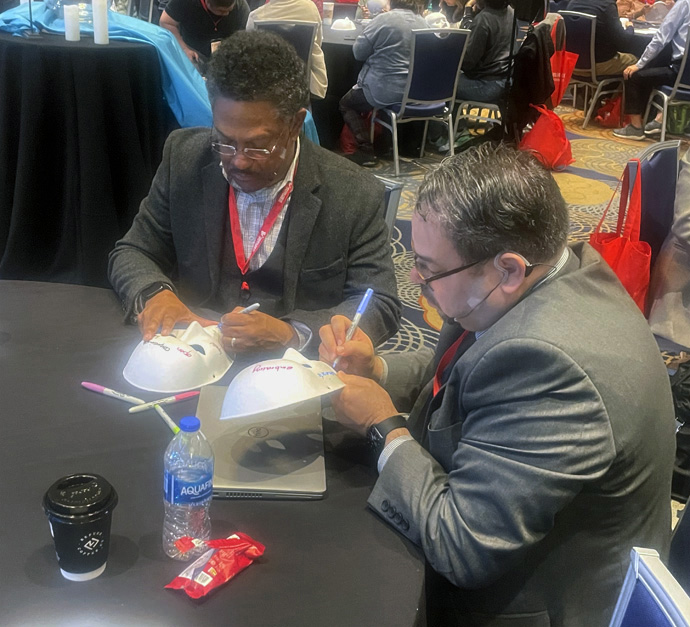
Los talleres de la conferencia incluyeron “Navegando contra los prejuicios”, “Cómo liderar una iglesia emocionalmente inteligente” y “Empatía y agotamiento” y el énfasis estuvo en dar herramientas a los/as pastores/as que se encuentran cansados/as por las duras circunstancias de sus trabajos.
"Creo que la pregunta de la conferencia fue: '¿Estamos tratando de cambiar a la gente en casa o estamos tratando de crear un espacio para que reconozcamos y afrontemos nuestro dolor?'. Tenemos que reconocer quiénes somos y dónde estamos con lo cual podríamos navegar mejor cuando regresemos" comentó Arroyo.
Algunos/as pastores/as de color dicen que sienten un componente racial en su lucha incluso por ser ordenados/as. “He estado en el proceso de ordenación del ministerio de la junta durante mucho tiempo” dijo Eric Reniva, pastor filipino y puertorriqueño de la Iglesia Metodista Unida Waterman en Waterman, Illinois. “Mi mayor queja es que eres lo suficientemente bueno para dirigir una iglesia local, pero no lo suficientemente bueno para ser ordenado” y agregó que ha visto a pastores/as blancos/as tener un recorrido tranquilo a través del proceso de ordenación y obtener nombramientos excelentes, especialmente pastores/as heredados/as, aquellos/as con familiares que han ocupado puestos de autoridad en La Iglesia Metodista Unida. Pero eso no le ha pasado a él.
"Siempre hay algo mal en tus respuestas; no eres lo suficientemente wesleyano o no entiendes esto o aquello o no tienes una gran explicación para el Libro de Disciplina y política. Cuando hablaban de sistemas que te reprimen y te dan miedo, ese es uno de ellos para mí" dijo Reniva.
Suscríbase a nuestro nuevo boletín electrónico en español y portugués UMCOMtigo
Arroyo dice que ha tenido sentimientos similares, a pesar de haber llegado a ser un alto funcionario de la iglesia: “Creo que, como persona de color, sé que tengo que trabajar más duro que mis hermanos/as blancos/as, sólo para que se me vea que estoy casi a la altura del liderazgo, casi”.
Reniva agregó que hablar abiertamente sobre cuestiones raciales no parece ser una buena opción: “Lo he experimentado en el seminario y en mi propio ministerio personal. Cuando predicas la verdad al poder, te pisotean. Quiero decir, es posible que te castiguen por ello”.
No todos los pastores de la conferencia están pasando apuros. Pero la Revda. Grace Han, pastora coreana de la históricamente blanca Iglesia Metodista Unida Trinidad en Alexandria, Virginia dijo que persisten algunos problemas. Ella es hija de dos clérigos metodistas unidos y se ha dado cuenta de que nadie asume que ella es la pastora de la iglesia, por lo que ella tiene que decirlo y allí surgen discusiones difíciles.
“Estaba en mi iglesia cuando George Floyd fue asesinado y a la luz de todos los movimientos La Vida de los/as Negros/as Importa, intenté tener conversaciones realmente honestas sobre cómo pensamos sobre la raza, cómo hablamos sobre la raza y cómo abordamos racismo, especialmente cuando está justo en nuestras pantallas de televisión para que todos/as lo vean”. Ella ha comenzado a tener esas conversaciones, pero se necesitan más, por lo que agregó: "No quiero presentarlo como una situación perfecta, y reconozco que he sido bendecida en mi contexto, lo aprecio y lo valoro. Así es que hay historias de éxito y no sólo dolorosas”.
Arroyo dijo que individuos y organizaciones como la Comisión de Religión y Raza “tienen que seguir presionando. Estamos llamados/as a hacerlo mejor, para poder avanzar hacia el Evangelio de Jesucristo, que es amor, y eso es importante”.
* Patterson es reportero de noticias para Noticias MU en Nashville, Tennessee. Lo puede llamar al (615) 742-5470 o escribirle a newsdesk@umcom.org. Para leer más noticias metodistas unidas, ideas e inspiración para el ministerio suscríbase gratis al UMCOMtigo.
** Leonor Yanez es traductora independiente. Puede escribirle a IMU Hispana-Latina @umcom.org

